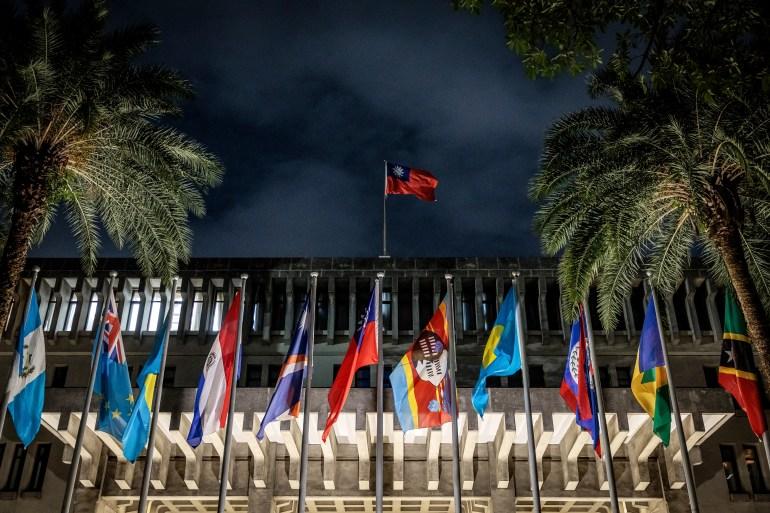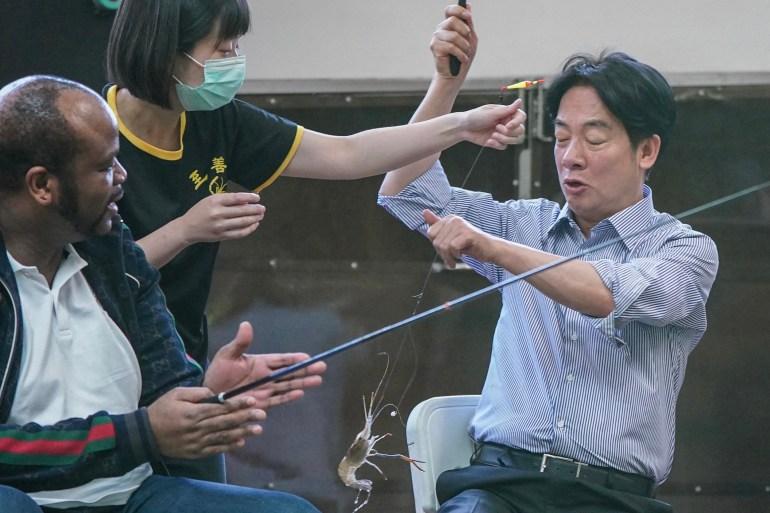Source: ALJAZEERA
ALJAZEERA MEDIA NETWORK

Taipei opts for practicality over ideology in its relations with its diplomatic partners, but this may not suffice to counter Beijing's influence.
Taipei, Taiwan – Hundreds of international delegates gathered in Taipei last month to witness William Lai Ching-te's inauguration as Taiwan’s fifth elected president.
Beijing, which lays claim to the democratic island, labeled Lai a “separatist” and “troublemaker,” yet this did not deter 508 foreign representatives from attending the event, enjoying the parade and an airshow.
However, among these attendees from nations like Japan, the UK, and the US, only a few were actual heads of state or senior figures.
These dignitaries were from Taiwan’s 12 remaining official diplomatic partners, including the king of Eswatini, the prime minister of Tuvalu, and the president of Paraguay. Flags representing their nations, along with Taiwan’s, adorned the inauguration venue, and each leader received special applause.
On the eve of the event, President-elect Lai and Vice President Hsiao Bi-khim hosted the foreign leaders for a prawn fishing activity.
“The Taiwanese government treasures its diplomatic partners,” remarked Fang-Yu Chen, assistant professor from the Department of Political Science at Soochow University in Taipei.
Since 2016 and the Democratic Progressive Party's (DPP) rise to power under Tsai Ing-wen, Beijing has exerted increased pressure on the island, which then had 22 official allies. Chinese officials rejected all talk offers and tried to woo Taiwan's allies.
With Lai’s win in January, the pressure continued, with Nauru siding with China just days after the election and Beijing criticizing nations like the Philippines for congratulating Lai.
Despite ongoing Chinese pressure, Taiwan aims to uphold its ties with formal allies through shared values of democracy, freedom, and human rights. Yet, according to Brian Hioe, a political commentator and founder of the Taiwan-focused magazine New Bloom, the reality is more complex.
“It’s geopolitical,” Hioe told Al Jazeera.
 Flags of Taiwan's remaining diplomatic allies on display outside the island's Ministry of Foreign Affairs.
Flags of Taiwan's remaining diplomatic allies on display outside the island's Ministry of Foreign Affairs.
This geopolitics was evident when Tsai transited through the US en route to visit Belize and Guatemala, where she met several US officials including then-Speaker Kevin McCarthy. Later, Lai also made US stopovers to meet American officials on his way to Paraguay.
Though the US formally aligns with China, it remains Taiwan’s key political and military partner, obligated by law to support the island’s self-defense through a policy of “strategic ambiguity.”
Meetings between Taiwanese and US officials often anger Beijing, which has not ruled out using force to seize Taiwan.
When Taiwan President Lee Teng-hui spoke at Cornell University in 1995, China launched missiles near Taiwan, sparking the Third Taiwan Strait Crisis. Similarly, Nancy Pelosi’s visit in 2022 led to unprecedented Chinese military drills around Taiwan.
According to Chen, “transit diplomacy” is a subtle way for Taiwan to maintain US relations without provoking China.
“Taiwan’s diplomatic allies are crucial even though they might be small economically and demographically,” Chen explained.
Another reason is the influence these allies hold in international forums.
In 1971, Taiwan’s UN seat went to the People’s Republic of China (PRC). Since then, Taiwan lost membership in several international bodies to Beijing.
“But Taiwan’s allies can use their seats in international organizations to advocate for Taiwan,” Chen noted.
For instance, during the World Health Assembly (WHA) opening in May, several allies called for Taiwan’s inclusion.
Taiwanese leaders often refer to the island as the Republic of China to underscore its separate status from the PRC, founded in 1949.
These formal allies support this narrative, according to Hioe.
“Diplomatic recognition by other states is one aspect of statehood. As long as Taiwan has allies, it can somewhat fulfill this definition of statehood,” he mentioned.
 William Lai and King Mswati III of Eswatini fishing for prawns at a shrimp farm in Taiwan.
William Lai and King Mswati III of Eswatini fishing for prawns at a shrimp farm in Taiwan.
Such pragmatism sometimes overlooks issues like human rights, Hioe pointed out.
Taiwan has had diplomatic relations with Haiti since 1956. Haiti, plagued by gang violence and unrest since President Jovenel Moise’s 2021 assassination, saw deteriorating human rights, as per a UN report in March.
“Despite talks about diplomatic allies, not much attention is on human rights in these countries,” Hioe said.
Taiwan condemned Moise’s assassination, focusing on its diplomats’ safety after armed men broke into its embassy. A Taiwanese diplomat expressed confidence in March that relations would stay stable due to cordial ties across Haiti's political spectrum.
Taipei also prioritizes stable relations with Eswatini, its only formal African ally, providing significant aid despite human rights abuses and lack of democratic institutions. Eswatini remains one of the last absolute monarchies in Africa.
Its government cracked down on pro-democracy protests in 2021, resulting in 46 deaths. Last year, an opposition politician and human rights lawyer was killed, leading his widow to criticize Taiwan’s aid to a dictator.
Taiwan’s Foreign Ministry reiterated bilateral cooperation with Eswatini's government and citizens after her criticism.
According to Yao-Yuan Yeh, an associate professor of Chinese Studies at the University of St Thomas in the US, Taiwan acknowledges the democratic flaws of some allies.
“But Taiwan’s foreign relations are more pragmatic than ideological,” he told Al Jazeera. “With few allies left, Taiwan cannot afford to push any away or lose them to China.”
The DPP’s pragmatic strategy has not always prevented ally shifts.
In 2016, soon after Tsai’s election, Sao Tome and Principe switched allegiance to Beijing. Since then, other nations followed suit. Shortly after Lai’s victory, Nauru also switched sides.
China’s Foreign Ministry spokesperson Mao Ning referred to “the one China principle,” affirming Taiwan as an inseparable part of China’s territory.
Analysts describe the situation in simpler terms: “Money,” said Yeh. “The right price.”
Taiwan calls it “dollar diplomacy,” a term Beijing rejects.
Last year, Honduras reportedly sought $2.5bn in aid from Taiwan but eventually switched to Beijing after Taiwan declined the request.
“China is bigger and can afford more than Taiwan,” Yeh observed.
With Lai likely continuing Tsai's policies and the DPP asserting Taiwan’s self-determination, pressures from China are expected to persist.
“Changing diplomatic alliances is a way for China to penalize the Taiwanese government for its China policy,” said Chen.
Your email address will not be published. Required fields are marked *